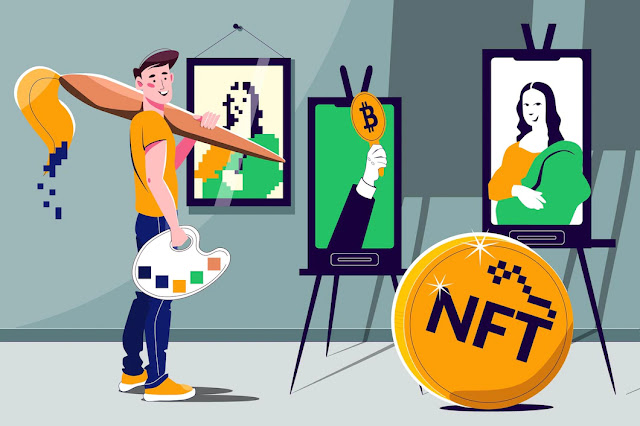NFT, Embrace the New Future of digital ownership!
Before we dive into NFTs, let's talk about
the blockchain. The blockchain is a decentralized ledger that records
transactions on a network. It is immutable, meaning once a transaction is
recorded, it cannot be altered. This makes it an ideal platform for proving
ownership.
NFTs, or non-fungible tokens, are a type of digital asset that is unique and cannot be replicated. They are stored on the blockchain and can be bought, sold, and traded like physical assets. NFTs have become increasingly popular in recent years as a way to prove ownership of digital art, music, and other creative works.
Understanding the Meaning of Non-Fungible Tokens
To understand NFTs, it's important to
understand the concept of fungibility. Fungible assets are interchangeable and have
the same value. For example, one dollar bill is the same as another dollar
bill. Non-fungible assets, on the other hand, are unique and have their own
value. A one-of-a-kind painting is a non-fungible asset.
NFTs are non-fungible tokens that represent ownership of a unique digital asset. They are created using smart contracts on the blockchain, which ensures their authenticity and uniqueness. NFTs can be used to represent anything from digital art to virtual real estate.
How Do NFTs Work on the Blockchain?
NFTs are created using smart contracts on
the blockchain. A smart contract is a self-executing contract with the terms of
the agreement between buyer and seller being directly written into lines of
code. When a buyer purchases an NFT, the smart contract transfers ownership of
the digital asset to the buyer. The transaction is recorded on the blockchain,
ensuring its authenticity and uniqueness.
NFTs can be bought and sold on NFT marketplaces, which are platforms that facilitate the exchange of digital assets. The buyer and seller agree on a price, and the transaction is executed through the smart contract. The buyer then becomes the new owner of the NFT and the digital asset it represents.
Advantages of Using NFTs
There are several advantages to using NFTs
for digital ownership. First, NFTs ensure authenticity and uniqueness. Because
they are stored on the blockchain, they cannot be replicated or altered. This
means that the owner of an NFT can prove ownership of a unique digital asset.
Second, NFTs provide a new revenue stream
for artists and creators. By selling their digital assets as NFTs, they can
earn money from the sale of their work. This has opened up new opportunities
for artists who may have previously struggled to make a living from their work.
Third, NFTs provide a way to preserve digital art and other creative works. Because they are stored on the blockchain, they can be accessed and viewed at any time. This ensures that the work will be preserved for future generations.
NFTs vs. Traditional Ownership Models
NFTs represent a new way of thinking about
ownership. Traditional ownership models rely on physical documents to prove
ownership. With NFTs, ownership is stored on the blockchain, which ensures its
authenticity and uniqueness. This makes it easier to prove ownership and
transfer ownership of digital assets.
Popular Use Cases of NFTs
NFTs have become increasingly popular in
recent years, with several high-profile sales making headlines. One of the most
famous examples is the sale of "Everday's: The First 5000 Days" by
digital artist Beeple for $69 million. This sale highlighted the potential of
NFTs as a new way to sell digital art.
Other popular use cases for NFTs include virtual real estate, gaming items, and collectibles. NFTs provide a way to prove ownership of these digital assets, which can have real-world value.
The Future of NFTs and Digital Ownership
As the world becomes more digital, the
concept of ownership will continue to change. NFTs provide a new way to prove
ownership of digital assets, and their popularity is only expected to grow. As
more artists and creators embrace NFTs, we can expect to see new and innovative
use cases for this technology.
In the future, we may see NFTs used to represent ownership of virtual worlds, social media profiles, and even personal data. NFTs provide a new way to think about ownership in the digital age, and their potential is only beginning to be realized.
Top NFT Marketplaces to Buy and Sell Digital Assets
If you're interested in buying or selling
NFTs, there are several marketplaces to choose from. Some of the most popular
include:
- OpenSea
- Nifty Gateway
- SuperRare
- Rarible
- Foundation
Each of these marketplaces has its own
unique features and user base. It's important to do your research and choose a
marketplace that best fits your needs.
Creating Your Own NFTs
If you're an artist or creator interested
in selling your work as NFTs, several platforms allow you to create and sell
your NFTs. Some of the most popular include:
- Mintable
- Cargo
- NiftyKit
- OpenSea
- Rarible
Conclusion: NFTs as the Future of Digital Ownership
NFTs represent a new way to think about
ownership in the digital age. They provide a way to prove ownership of digital
assets and offer a new revenue stream for artists and creators. As the world
becomes more digital, NFTs are poised to become the new standard of digital
ownership.
If you're interested in buying or selling
NFTs, there are several marketplaces to choose from. And if you're an artist or
creator, several platforms allow you to create and sell your NFTs.
As we look to the future, we can expect to
see new and innovative use cases for NFTs. They provide a way to think about
ownership that is unique to the digital age, and their potential is only
beginning to be realized.






.png)



Comments
Post a Comment
Fellow beings comment about my blog not about your personal vendettas.